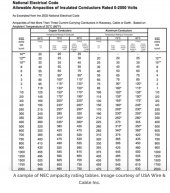Savagesymbiote86
New Member
- Joined
- Jul 25, 2021
- Messages
- 3
Hi this is my first build to partially charge my PHEV.
PIP LV2424 MSD 24V 2.4kW, 120V Output, 2kW Solar Input 80A Mppt
RICH SOLAR 200 Watt 24 Volt Moncrystalline Solar Panel
2 12V 100Ah Solar AGM DEEP Cycle Battery
200amp Slo Blo fuse
I did the math & the draw is 1440watts, which should let me charge the car for 30mins & then charge the batteries & charge the car another 30mins at the end of the day. i do plan on getting another solar panel 2 12v 100Ah Li batteries in 3-4 months. The fuse is to connect to the batteries since they're AGM, was wondering what guage wires to use for connections.
PIP LV2424 MSD 24V 2.4kW, 120V Output, 2kW Solar Input 80A Mppt
RICH SOLAR 200 Watt 24 Volt Moncrystalline Solar Panel
2 12V 100Ah Solar AGM DEEP Cycle Battery
200amp Slo Blo fuse
I did the math & the draw is 1440watts, which should let me charge the car for 30mins & then charge the batteries & charge the car another 30mins at the end of the day. i do plan on getting another solar panel 2 12v 100Ah Li batteries in 3-4 months. The fuse is to connect to the batteries since they're AGM, was wondering what guage wires to use for connections.



